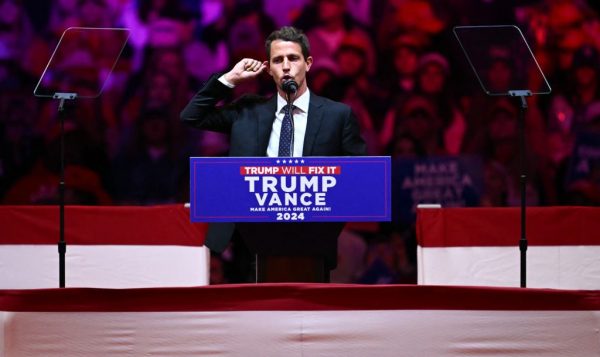Today’s outrage du jour is a microcosm of the presidential race. As tantalizingly close as Kamala Harris has gotten to overcoming Joe Biden’s many political liabilities, she can’t quite escape them in the end.
On Tuesday, she delivered her “closing argument” in front of the White House and distinguished herself from her opponent by emphasizing that she respects Americans who differ with her. “I will always listen to you, even if you don’t vote for me,” she said at one point. “Unlike Donald Trump, I don’t believe people who disagree with me are the enemy,” she later added. “He wants to put them in jail. I’ll give them a seat at my table.”
That was a nod to Liz Cheney Republicans, of course, but also a nudge to casual voters for whom the choice might come down to “vibes.” Better angels or greater demons: Which will it be?
Then, right around the time Harris was making that point, Joe Biden piped up and everyone lost their minds.
What the president means to say and what comes out of his mouth are often two different things, as you may have noticed if you watched his debate with Trump in June. In this case, the White House would have us believe that he was simply misunderstood. Biden didn’t say “the only garbage I see floating out there is his supporters,” referring to Trump voters; he said “the only garbage I see floating out there is his supporter’s,” referring to Tony Hinchcliffe’s dig at Puerto Rico at Sunday’s rally in New York City. Singular possessive, not plural.
That’s the spin. I don’t buy it.
I think this is an instance of a man disinhibited by age indulging his disgust at Trump’s movement and undermining his vice president’s message in the process, and not for the first time. Throughout the campaign, Harris has silenced chants of “lock him up” at her rallies by reminding crowds that the courts should decide Trump’s pending criminal cases, not politics. But in New Hampshire last week, Biden brought up Trump in front of a crowd of his own and crowed that “we gotta lock him up”—before catching himself and clarifying, lamely, that he meant “politically lock him up,” as if that makes sense.
He and Harris scrambled in the aftermath of Tuesday’s “garbage” comment to contain the damage. Biden’s team posted a statement on social media insisting that the garbage in question was Hinchcliffe’s joke, not Trump voters writ large. On Wednesday, Harris told reporters that she believed the president had clarified his remarks—but created some distance anyway. “Let me be clear,” she said. “I strongly disagree with any criticism of people based on who they vote for. You heard my speech last night.”
If you’re an optimist, you might view this episode as an opportunity for her to belatedly break with the unpopular incumbent. But however she ends up handling it, the fact is that Biden stepped squarely on her closing argument and forced her into a defensive crouch in the final days of the campaign. It’s appalling. No wonder she doesn’t want him on the campaign trail.
The only good thing that will come from it, I think, is reassurance for Democrats that the switcheroo at the top of the ticket this year was plainly the right move no matter what happens on Tuesday.
As for the theatrical outrage at Biden that Republicans are expressing today, though, I feel about it the same way I feel when they complain about liberal media bias. They absolutely have a point, and it’s absolutely impossible to take them seriously.
Kabuki grievance.
Feeling contempt for huge numbers of Americans as this election plays out isn’t merely justified, I’d argue, it’s a sign of moral health. You can make a decent living expounding on the subject in a daily political newsletter, from what I understand.
But there are certain jobs where contempt for the other side won’t fly. Like, say, governing a country in which the other side comprises half the population.
Republicans have every reason to take offense at Biden’s remark. And not just Republicans: Those of us prone to lecture about “norms” and “divisiveness” shouldn’t want someone in charge who’s given to calling Americans “garbage” in anger, whether or not that someone’s name is “Donald Trump.” Joe Biden has always had a demagogic streak; it would be a nice surprise if Harris wins to find that hers isn’t as strong.
The question, though, is how sincere Republicans’ outrage at Biden today can possibly be as they prepare to reelect the most cartoonish demagogue in American history.
I truly don’t mean that in a “whataboutist” sense, where the other side’s failures are taken as moral license to behave equally badly. The fact that Trump describes his antagonists as “vermin,” “enemies from within,” and—in the case of Never Trumpers like me—“human scum” doesn’t entitle Biden or Harris to do the same.
What I mean is that right-wingers grumbling about Biden’s “garbage” comment can’t possibly be earnestly offended, seeing as how eager they are to be governed by a figure who’s more vicious than Biden and more likely to behave autocratically because of it. It’s as preposterous and hypocritical as the right’s many media watchdogs turning a blind eye to their own industry’s descent into out-and-out propaganda. Or wondering whether someone as awkward in interviews as Harris is can be fit for office even as Trump descends into aged incoherence right in front of them. Or grousing about Harris calling Trump a “fascist,” accurately, when he’s called her that inaccurately numerous times.
No, their anger at Biden isn’t in good faith. After nine years of this insanity, it can’t be. By definition, a political movement premised on distinguishing “real Americans” from undesirables and usurpers has no objection in principle to the idea that certain classes of citizens are “garbage.” Their objection has to do solely with who gets to decide who the “garbage” is. Trump Republicans can wear “f–k your feelings” T-shirts or they can be snowflakes heartbroken by mumbling Grandpa Joe’s unkind words, but they can’t be both.
If I’m right that their grievance is insincere, then today’s “scandal” involving the president is a strange one insofar as no one on either side is actually scandalized by it. “A good societal rule of thumb we should enforce is ensuring people are actually offended/hurt by a thing before we reward them with desired victim status from fallout to said thing,” The Bulwark’s Tim Miller quipped as the obligatory outrage cycle—and fundraising—ensued following Biden’s remark.
So why, if Republicans aren’t actually offended, are they talking about it?
Partly, I suspect, the answer has to do with old-fashioned opportunism, as Trump needs low-propensity voters who favor him to turn out en masse next Tuesday. Harris’ kumbaya message last night was designed to lull those voters into staying home by reassuring them that, if she’s elected, the stakes for them will be low. The pearl-clutching over Biden’s remark is designed to do the opposite. It’s like when a coach posts something disparaging on the locker-room bulletin board that was said by a player on the other team: The angrier your guys are, the harder they’ll play.
Republicans are also talking about Biden’s insult because Team Trump wants to change the subject from Harris’ closing argument and/or Hinchcliffe’s Don Rickles routine about Puerto Ricans. A friend told me recently that she thought the great Republican freakout about Haitians eating cats in September didn’t happen organically but rather was orchestrated by Trump and J.D. Vance to steer the conversation away from Harris’ debate performance on September 10. I think that gives Team MAGA too much credit for clever deviousness—but admittedly, if there’s one thing Trump understands in his bones, it’s how to manipulate the media’s attention.
There’s another reason Biden’s remark has broken through, though. It’s an echo of modern populists’ ur-grievance.
‘Deplorables,’ revisited.
On Tuesday night, as insincere outrage at the president percolated, columnist Justin Baragona posted a funny thread on Twitter chronicling the many times over the last few years that Fox News has described insults aimed at Republicans by Democrats as “a ‘deplorables’ moment.”
“Deplorables,” of course, refers to Hillary Clinton’s infamous comment at a fundraiser in 2016: “To just be grossly generalistic, you could put half of Trump’s supporters into what I call the basket of deplorables. Right? The racist, sexist, homophobic, xenophobic, Islamophobic—you name it. And unfortunately there are people like that. And he has lifted them up.”
We can argue over whether her estimate was too high and, if so, by how much. But I invite the reader to reflect on her comments on Tuesday night as the returns stream in and the most cartoonish demagogue in American history, having run the most cartoonishly demagogic campaign in American history, either wins the presidency outright or comes within a whisker of doing so.
Clinton’s “deplorables” comment resonated at the time and continues to do so today because it confirmed populists’ suspicions that the country’s ruling class views many Americans with contempt. The fact that it was Hillary, of all people, who voiced the sentiment made it that much more inflammatory: The would-be first woman president was a feminist, a product of the Ivy League, and a political figure with 25 years of animosity toward Republican voters behind her. To be looked down upon by your leaders is one thing; to be looked down upon by the epitome of the hyper-educated liberal elite is quite another.
And so “deplorables” became the ur-grievance for populists, one-word shorthand for everything that’s wrong with the political establishment. It remains so potent that when Fox News’ Bret Baier got a chance to interview Harris a few weeks ago, he tried to goad her into repeating the substance of Clinton’s comment. She didn’t take the bait.
But Joe Biden did when he took to babbling about “garbage” on Tuesday night.
To Trumpers, having the president reiterate the thrust of Hillary’s “deplorables” remark eight years later might function as last-second confirmation that the war on the ruling class that began in 2016 isn’t yet won, that a second Trump term will be needed to achieve whatever it is they think they’re going to achieve. It’s a casus belli, a reminder before battle of “why we fight.”
For the same reason, it could help reinforce a sense of partisan us-and-them tribalism among wayward Republicans who are wavering on whether to vote for Trump this year. You, the Reaganite conservative, may not want to be part of the MAGA community, but to the president, you’re just right-wing “garbage” by dint of your votes in 2016 and 2020. You can reward him for despising you by supporting his vice president, or you can stick with populist Republicans, who’ll at least tolerate you. Sort of.
Above all, Republicans cherish the “deplorables” ur-grievance because it grants permission for Trump to behave as disgustingly as he likes. No matter how abusive he is in a second term, no matter how much trouble he causes the country, you can sleep at night knowing that at the very least your leader doesn’t think you’re “garbage.” (Just a colossal sucker to be monetized.) That’s the sort of moral license to behave badly that I mentioned earlier: If politics is just a death match between leaders who do and don’t view you contemptuously, you back the latter unquestioningly and don’t devote a second thought to what sort of tactics might be needed to win.
The great irony of Hillary Clinton’s “deplorables” remark is that, by framing the choice in 2016 in those terms, she helped Trump catalyze a form of politics that’s led right-wingers to prove her right by behaving ever more deplorably over time. Coup plots, criminal indictments, full-spectrum ruthlessness toward one’s cultural enemies: It’s all fair game in winning the war on America’s condescending elites. You can draw a straight line from Clinton’s remark to Trump receiving no flak from his base for describing America as a “garbage” receptacle for other countries’ immigrants and then a straight line from that to Biden’s “garbage” comment.
The populist right has become deplorable, in the image of its hero, and the president foolishly and intemperately couldn’t keep his awareness of that fact to himself.
Who we are.
“Donald Trump has spent a decade trying to keep the American people divided and afraid of each other—that’s who he is,” Kamala Harris said during her closing argument. “But America, I am here tonight to say, that’s not who we are.”
Is that so? At what point in the ongoing decade-long saga of strongman miscreant Donald Trump winning and almost winning the presidency do we consider the possibility that this actually is “who we are”?
On Monday, an arm of Johns Hopkins University published the results of a survey in which Americans were asked whether the other party isn’t just wrong for its politics but “downright evil.” Three-quarters of Republicans who believe Trump won in 2020 at least somewhat agreed. The figures among Democrats and Republicans who believe Biden won in 2020? Just under 50 percent and 30 percent, respectively.
On Tuesday, the president of the Public Religion Research Institute posted an analysis of his firm’s “chilling” findings on subjects like Christian nationalism and political violence. When asked whether immigrants are “poisoning the blood of our country,” a phrase famously used by Trump, 61 percent of Republicans agreed versus 30 percent of independents and 13 percent of Democrats. When tested on support for various authoritarian beliefs, 75 percent of Republicans who view Trump favorably scored “very high” or “high.” That was nearly twice the share of Republicans who view him unfavorably.
None of this entitles the president of the United States to call his constituents “garbage.” But right now, Joe Biden is staring down the barrel of another election in which even a Donald Trump defeat will plunge the country into the madness of another coup attempt. Republicans, especially anti-Trump Republicans, had numerous opportunities to avert that—turning against him after January 6, choosing a different nominee in the primary, backing Harris as the lesser evil in the general election—and declined at every turn. In fact, because expectations for a Trump victory are higher this year on the right, I expect the right’s insurrectionist impulse following a surprise loss to Harris would be more intense this time than it was last time.
Being president means not voicing every uncharitable thought you have. (Unless you’re Donald Trump, I mean, in which case “mean tweets” and conspiracy theories are no big deal.) But how can anyone fault Biden for feeling uncharitable in this moment? He’ll make a fine political newsletter writer in retirement. Or would, I guess, if he could still string two coherent sentences together.







Please note that we at The Dispatch hold ourselves, our work, and our commenters to a higher standard than other places on the internet. We welcome comments that foster genuine debate or discussion—including comments critical of us or our work—but responses that include ad hominem attacks on fellow Dispatch members or are intended to stoke fear and anger may be moderated.
With your membership, you only have the ability to comment on The Morning Dispatch articles. Consider upgrading to join the conversation everywhere.